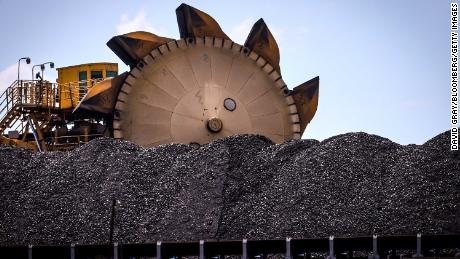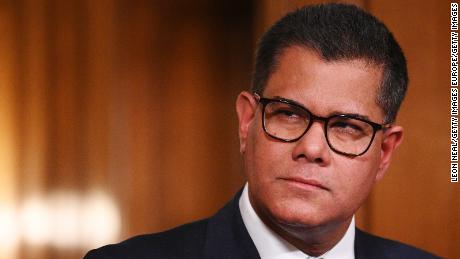London (CNN Business)Australian Prime Minister Scott Morrison all but admitted Thursday that his country had asked UK negotiators to exclude particular climate commitments from a free trade deal agreed in principle in June.
The UK government, which is chairing November's COP26 international climate talks, as well as Australia's have come under pressure since Sky News reported a leaked email Wednesday from a British trade "deputy director" alleging that UK business secretary Kwasi Kwarteng had agreed that the Department of International Trade could "drop both of the climate asks," including "a reference to Paris Agreement temperature goals."
CNN has not been able to verify the contents of the leaked email and UK officials have declined to confirm its authenticity, but when journalists in Canberra asked Morrison why Australia had asked for the temperature reference to be excluded, Morrison ŌĆö without confirming the Sky News story ŌĆö said Australia wanted to keep climate and trade issues separate.
"Well, it was about trade. It wasn't a climate agreement, it was a trade agreement. And ... in trade agreements, I deal with trade issues. In climate agreements, I deal with climate issues," he told a press conference Thursday, according to a readout posted by his office.
"We're pursuing agreements on clean energy technology with a vast number of countries, and we'll have agreements about that. But the key agreement we've made is when we signed up to Paris, and the commitments that we made to achieve those. Those commitments are clear," he said.
The reporting from Sky News suggested that the issue hinged on whether to explicitly mention a goal to contain global warming to 1.5 degrees Celsius above pre-industrial levels. The Paris Agreement obliges countries to try and contain the average global temperature rise to 2┬░C, with a preference for closer to 1.5┬░C.
The UK's Department of International Trade had pushed back on Sky's reporting Wednesday, saying that it was "completely untrue" that the deal would not "sign up to" the commitments made in the Paris Agreement.
"Our ambitious trade deal with Australia will include a substantive article on climate change which reaffirms both parties' commitments to The Paris Agreement and achieving its goals, including limiting global warming to 1.5 degrees. Any suggestion the deal won't sign up to these vital commitments is completely untrue," the statement said.
But when asked specifically by CNN whether "1.5┬░C" would be included in the agreement, the department said it would not disclose the details of the negotiations. Kwarteng's office did not comment on the reports and directed CNN to the trade department's statement.
Other free trade agreements signed by the United Kingdom, such as one with the European Union, mention 1.5┬░C explicitly.
Morrison says 'Australia's doing it' on climate
When asked about Australia's stance on lowering the warming limit to 1.5┬░C, Morrison only pointed to the Paris Agreement, which contains the 2┬░C target.
"We have signed up to our commitments under the Paris Agreement. We will meet them. We will beat them," he said.
He added that while other countries were still making commitments, "Australia's doing it. Australians are doing it. Australian businesses are doing it."
"And that's the story that we can tell to the rest of the world. Australians, we just get on with it and we are."
The comments will be a new headache for COP26 President Alok Sharma, a British MP who is traveling the world trying to firm up commitments to 1.5┬░C ahead November's talks in Glasgow. He just finished a trip to China, during which he stressed the importance of signing up to the more ambitious limit.
His office would not comment on the trade deal to CNN.
A source told CNN during a recent G20 ministerial meeting that several fossil fuel producing countries were opposing the more ambitious limit to global warming. China has openly accused the West of trying to move the goal posts on the 2-degree target.
Australia is the world's second-biggest exporter of coal and its resources minister, Keith Pitt, said last week it would continue to extract and export the fossil fuel well beyond 2030, in response to a senior UN climate official, Selwin Hart, warning that the climate crisis would "wreak havoc" on the Australian economy.
Sharma is also trying to get developed nations to end the use of unabated coal, which is coal burned without capturing the carbon emitted, by the end of the decade.
A member of the UK's main opposition Labour Party ŌĆö Ed Miliband, who oversees trade in the political shadow opposition ŌĆö criticized the UK government for bowing to Australia's pressure on climate.
"Australia is one of the world's biggest polluters and key to the goal of limiting global warming to 1.5 degrees. But rather than piling pressure on them, the Government has simply rolled over," he wrote on Twitter.
Morrison made his comments after the Australian Minister for Trade, Tourism and Investment Dan Tehan said that the country had "remained consistent" in ensuring all of its trade agreements met "existing multilateral environment commitments."
The Australian Department of Foreign Affairs and Trade, which sent the statement including Tehan's comments, did not respond to CNN's question of whether "1.5┬░C," would be mentioned in the trade agreement.
The UK-Australia trade deal was agreed in principle in June. It was touted as a success by both sides and particularly by the UK government, which had sold the freedom to strike up bilateral trade deals as a key benefit for leaving the European Union.
Australia is coming under increasing pressure to boost its climate commitments ahead of the talks in Glasgow. The country is among dozens that missed a July 31 deadline to improve its pledge to reduce greenhouse gas emissions, as signatories to the 2015 Paris Agreement were obliged to do.
The country has agreed to reduce emissions by between 26% and 28% by 2030, from 2005 levels, well below the renewed commitments by the United States, European Union and United Kingdom, among other developed nations. The Australian government has said it will increase its pledge before talks in Glasgow.
Australia has a population of around 25 million people, and it accounts for just over 1% of the world's carbon emissions. But per capita, Australians emit more than 15 metric tons of carbon, World Bank data shows, around the same as people in the United States, which is the world's second-biggest carbon emitter and responsible for more than 14% of emissions.






